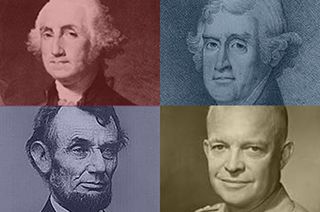Lincoln vs. Eisenhower: Most Science-Friendly President to Be Voted In

Which U.S. president was most science-friendly? A new contest by the Union of Concerned Scientists (UCS) pits Lincoln against Eisenhower and Kennedy against Nixon in a match-up just in time for President's Day (Feb. 17).
The goal of the contest is to highlight science in the presidents' careers, "whether it’s Jefferson commissioning the Lewis and Clark expedition, Theodore Roosevelt pushing for the Pure Food and Drug Act, or George H.W. Bush launching new Earth observation programs," said Aaron Huertas, a spokesman for the UCS, a nonprofit organization that promotes science in the public sphere.
The public can see the presidents' accomplishments and vote for their favorites at the website of the UCS Center for Science and Democracy. [6 Politicians Who Got the Science Wrong]
In the first round of competition, Abraham Lincoln goes head-to-head with Dwight Eisenhower. Lincoln's scientific accomplishments include being an inventor (he held a patent for a device to lift boats over shoals) and creating the National Academy of Sciences. Eisenhower, on the other hand, launched NASA.
Meanwhile, Jimmy Carter, who created the Department of Energy and expanded nuclear safety inspections, goes head-to-head with education-loving Thomas Jefferson, who founded the University of Virginia and commissioned the Lewis and Clark expedition to map and survey the West.
George H.W. Bush goes up against Theodore Roosevelt. The former made moves against chlorofluorocarbons (CFCs), which damage the ozone layer, and acid rain. The latter was a staunch conservationist, who created five national parks and personality mapped The Rio Roosevelt (previously known as the Rio da Dúvida, or River of Doubt) in Brazil.
Finally, just as John F. Kennedy and Richard Nixon went mano-a-mano in the nation's first televised presidential campaign debate in 1960, they're up against each other again, this time for their science prowess. Kennedy, of course, initiated Project Apollo, which would send mankind to the moon. Nixon instituted environmental protections in the form of a new Endangered Species Act, among other laws, and founded the National Oceanic and Atmospheric Administration (NOAA) and the Environmental Protection Agency (EPA).
Sign up for the Live Science daily newsletter now
Get the world’s most fascinating discoveries delivered straight to your inbox.
The winners of Round 1 will face off in Round 2 over President's weekend.
Follow Stephanie Pappas on Twitter and Google+. Follow us @livescience, Facebook & Google+. Original article on Live Science.

Stephanie Pappas is a contributing writer for Live Science, covering topics ranging from geoscience to archaeology to the human brain and behavior. She was previously a senior writer for Live Science but is now a freelancer based in Denver, Colorado, and regularly contributes to Scientific American and The Monitor, the monthly magazine of the American Psychological Association. Stephanie received a bachelor's degree in psychology from the University of South Carolina and a graduate certificate in science communication from the University of California, Santa Cruz.
